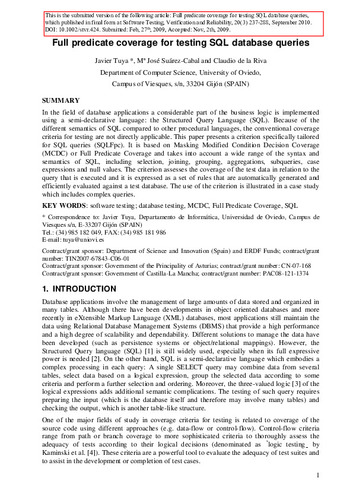Full predicate coverage for testing SQL database queries
Autor(es) y otros:
Palabra(s) clave:
Software testing
Database testing
MCDC
Fecha de publicación:
Editorial:
Wiley
Versión del editor:
Citación:
Descripción física:
Resumen:
In the field of database applications a considerable part of the business logic is implemented using a semi-declarative language: the Structured Query Language (SQL). Because of the different semantics of SQL compared to other procedural languages, the conventional coverage criteria for testing are not directly applicable. This paper presents a criterion specifically tailored for SQL queries (SQLFpc). It is based on Masking Modified Condition Decision Coverage (MCDC) or Full Predicate Coverage and takes into account a wide range of the syntax and semantics of SQL, including selection, joining, grouping, aggregations, subqueries, case expressions and null values. The criterion assesses the coverage of the test data in relation to the query that is executed and it is expressed as a set of rules that are automatically generated and efficiently evaluated against a test database. The use of the criterion is illustrated in a case study which includes complex queries
In the field of database applications a considerable part of the business logic is implemented using a semi-declarative language: the Structured Query Language (SQL). Because of the different semantics of SQL compared to other procedural languages, the conventional coverage criteria for testing are not directly applicable. This paper presents a criterion specifically tailored for SQL queries (SQLFpc). It is based on Masking Modified Condition Decision Coverage (MCDC) or Full Predicate Coverage and takes into account a wide range of the syntax and semantics of SQL, including selection, joining, grouping, aggregations, subqueries, case expressions and null values. The criterion assesses the coverage of the test data in relation to the query that is executed and it is expressed as a set of rules that are automatically generated and efficiently evaluated against a test database. The use of the criterion is illustrated in a case study which includes complex queries
ISSN:
Identificador local:
20101070
DOI:
Colecciones
- Artículos [37538]
- Informática [875]
Ficheros en el ítem





